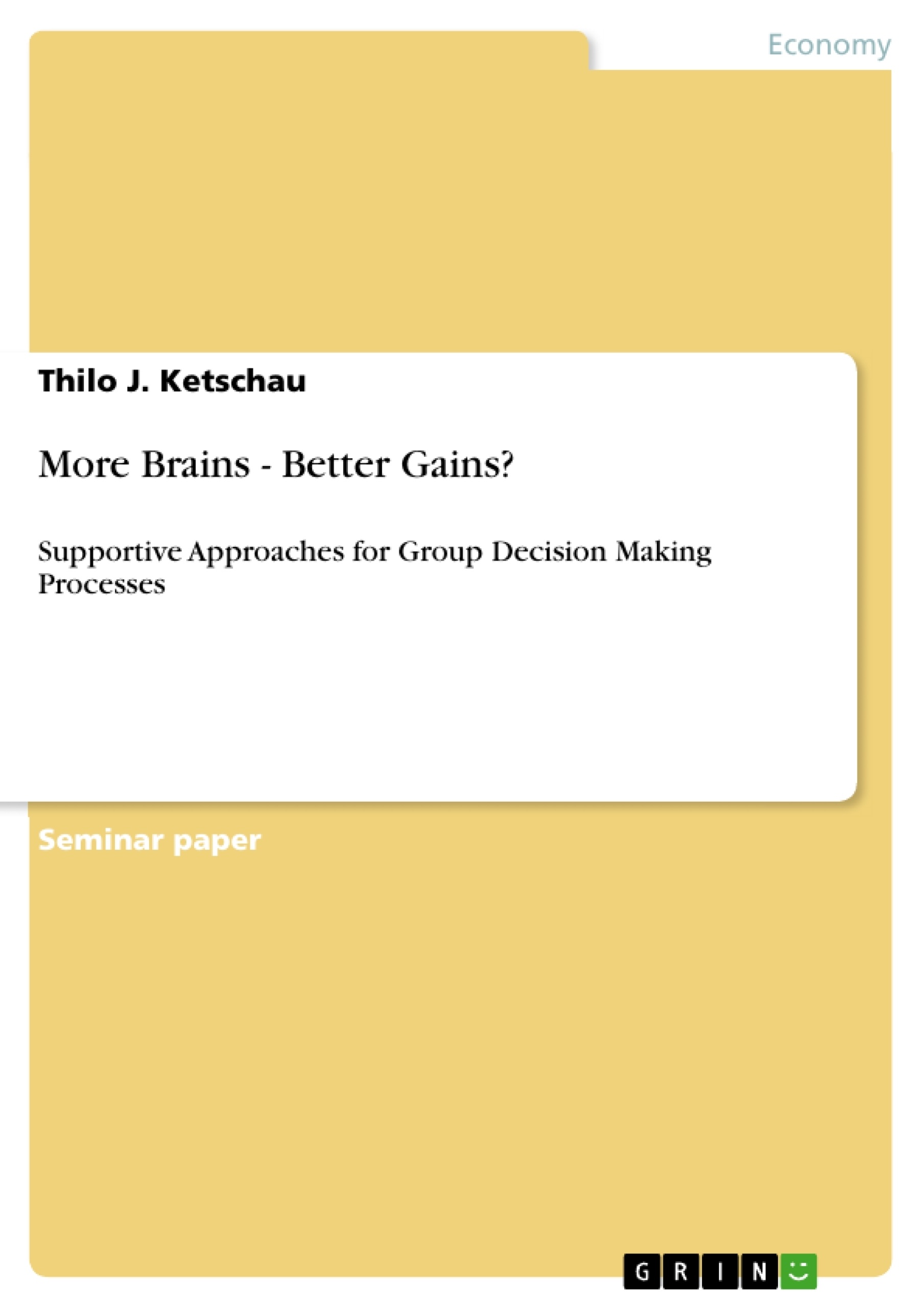Decision making in groups is commonly considered to be more productive and valid than individual decision making. But due to behavioural scientific approaches it has been evaluated that results of group decision making are often inappropriate due to different harmful phenomena and mechanisms. The following paper will discuss the most essential findings and solution approaches according to group decision making threats, and the solution approaches will be categorized in a matrix to offer an instrument for an easy overview and therefore purposeful implementation of them.
Inhaltsverzeichnis (Table of Contents)
- Executive Summary
- 1 Introduction
- 1.1 Problem Definition
- 1.2 Objectives
- 1.3 Methodology
- 1.4 Relevant Definitions and Assumptions
- 2 Threats for Group Decision Making
- 3 Supportive Approaches for Group Decision Making
- 3.1 Individual Dimension
- 3.2 Group Internal Organisational Dimension
- 3.3 Group External Organisational Dimension
- 4 Tabular Overview of the Guideline to Support Group Decision Making
- 5 Conclusion
Zielsetzung und Themenschwerpunkte (Objectives and Key Themes)
The objective of this paper is to discuss solution approaches that prevent wrong or inadequate group decision making (GDM) and to categorize them for a better overview. The main focus lies on supportive approaches considering behavioral scientific or organizational approaches.
- Threats to group decision-making
- Supportive approaches to improve group decision-making processes
- Categorization of supportive approaches according to individual, group internal, and group external organizational dimensions
- Guidelines for supporting group decision making in various phases
- Importance of continuous improvement and education regarding group decision-making processes
Zusammenfassung der Kapitel (Chapter Summaries)
- Chapter 1: Introduction introduces the topic of group decision-making and its potential pitfalls. It highlights the common assumption that group decisions are superior to individual decisions, but acknowledges the existence of numerous instances where group decisions have led to disastrous outcomes. The chapter outlines the objectives and methodology of the paper, and defines relevant terms and assumptions used throughout the study.
- Chapter 2: Threats for Group Decision Making explores various theoretical frameworks that explain potential problems within group decision-making processes. These frameworks include Janis’ groupthink model, Lencioni's analysis of lack of commitment, Hackman's concerns regarding coordination and motivation, Rothmund's individual-psychological approach, and Frisch's logic construct.
- Chapter 3: Supportive Approaches for Group Decision Making examines various proposals to prevent or solve the deficits and problems identified in Chapter 2. It categorizes these approaches into three dimensions: individual, group internal organizational, and group external organizational. Chapter 3 discusses a range of suggestions, including self-reflection, the use of external voices, the devils' advocate, and the importance of procedural and substantive rules.
- Chapter 4: Tabular Overview of the Guideline to Support Group Decision Making summarizes the suggestions and measures discussed in Chapter 3 into a matrix format. This matrix categorizes the suggestions according to their intended effect during specific phases of the GDM process: pre-GDM, consideration, discussion, and finalization. The matrix also includes the three dimensions outlined in Chapter 3, offering a comprehensive framework for improving GDM.
Schlüsselwörter (Keywords)
This paper explores the challenges and solutions related to group decision-making. It examines concepts like groupthink, individual opportunism, and lack of individual engagement. The paper also focuses on supportive approaches like self-reflection, the use of external voices, the devils' advocate, and the importance of clear communication and transparency.
Frequently Asked Questions
Why can group decision making lead to poor results?
Various phenomena like "groupthink," lack of commitment, and individual opportunism can hinder the effectiveness of group decisions.
What is Janis’ "groupthink" model?
It is a psychological phenomenon where the desire for harmony in a group results in irrational or dysfunctional decision-making outcomes.
How can a "Devil's Advocate" improve group decisions?
By assigning someone to challenge the group's assumptions, it prevents premature consensus and encourages critical thinking.
What are the three dimensions of supportive approaches for GDM?
The paper categorizes solutions into the individual dimension, group internal organizational dimension, and group external organizational dimension.
What is the purpose of the matrix provided in the paper?
The matrix offers a guideline for implementing supportive measures during different phases of the decision process: pre-GDM, consideration, discussion, and finalization.
- Arbeit zitieren
- Dipl. Päd. Thilo J. Ketschau (Autor:in), 2013, More Brains - Better Gains?, München, GRIN Verlag, https://www.hausarbeiten.de/document/263365


